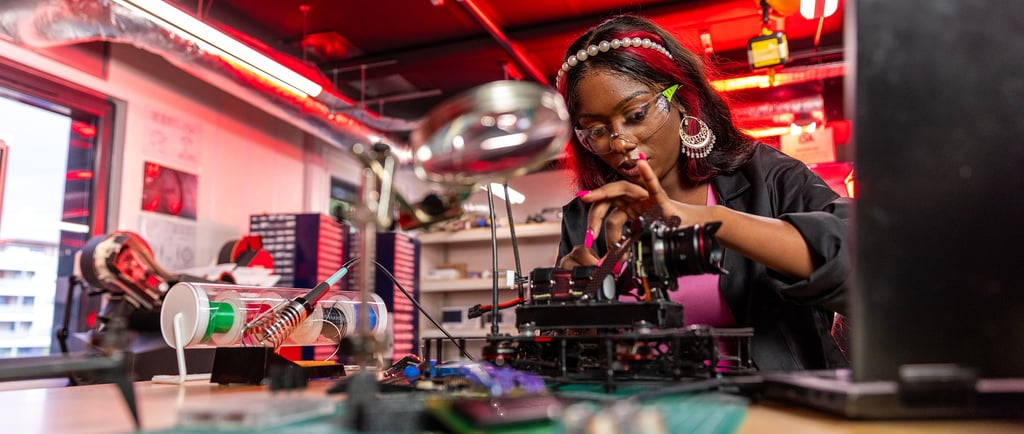Unlocking Innovation with Robotics Projects at Forte9
Robotics projects involve designing and building intelligent machines that can sense, process, and act in the physical world. These projects range from autonomous robots and robotic arms to drones and humanoids, often incorporating technologies like AI, sensors, and actuators.......
ARTICLE
12/27/20244 min read


Unlocking Innovation with Robotics Projects at Forte9
Robotics has become the new revolution that combines mechanical engineering, electrical engineering, and computer science to produce machines that perform the work without or with the help of a human touch. It offers unreeling applications from manufacture to space exploration and into entertainment and healthcare. This is what we are trying to do at Forte9-we are providing students with practical experience in robotics since it is a technology that can transform their lives.
Importance of Robotics Projects for Students
Robotics transforms the techno world. Most students pursuing courses in engineering, computer science, and technology should take Deens engaged in cool robotics projects, which give deep insights through practical learning. These projects help understand the theoretical foundation made by chinai, as well as a fashion to foster the students' skills-in-hean troubleshooting and design requirements for building and programming robots.
Most importantly, robotics projects can encourage creativity, critical thinking, and teamwork. Most of the time, students face challenging puzzles in teams, and they work together, which then helps them carry out many important skills, including mechanical design, electronics design, sensor integration, and coding-all very important skills to have in today's world of automation and robotics engineering.
Forte9 Robotics Initiatives
There are robotics projects for all levels of students here. These include beginners and advanced students, and each project is structured with flexibility. The various robotics projects that Forte9 has to offer are highlighted below.
1. Autonomous Robots
Independent tasks are done by autonomous robots. These robots will perform tasks in an environment using various sensors, cameras, and algorithms. Students in the autonomous robots project learn artificial intelligence, machine learning, sensor fusion, learning different algorithms, pathfinding, object detection, decision-making.
2. Robotic Arms
A robotic arm serves as a mechanical apparatus to conduct jobs such as lifting objects, transporting objects, and manipulating them. Creating robotic arms educates the students about servos, motors, and precision-control techniques. Moreover, they learn to use programming languages such as Python or C++ to give specific movements, which essentially means the use of the hardware and software.
3. Line Following Robots
This is an amazing entry-level robotics project in which students make use of sensors and programming to control motors. They follow a specific track, usually a black line on a white background. Students also learn how to use infrared sensors and write their algorithms, which enhance their coding and problem-solving abilities.
4. Swarm Robotics
It is exactly similar to that of an ant colony or a bee colony: one task requires a lot of robots to work together. Hence, this project introduces students to multi-agent systems, decentralized control, and coordination algorithms. In fact, after they build a swarm of robots that work in unison, students also get to learn how to solve collective problems and work as a team.
5. Robotic Prosthesis
More complex robots are developed and programmed with an aim to manufacture robotic prosthetics. These prosthetic limbs can be controlled by human beings in an integrated fashion with the human body. This project covers studies in robotics, engineering, and biomedical applications, imparting learning of health care, sensor integration, and design with emphasis on human centricity to students.
How Forte9 aids students with robotics projects
Forte9 realizes that a systematic but flexible approach to learning is of utmost importance for students regarding developing robotics. The following is how learning can be maximized through robotics projects at Forte9:
Expert Guidance:
Prior to the complete lifecycle of a project, students can rely on the expertise of one of our experienced engineers and instructors in troubleshooting technical issues and providing support and assistance throughout the project lifecycle.
Hands-on Learning:
Students have continuous access to real robotics kits and other equipment to gain very effective experiential training that will further their understanding of robotics and engage with engineering concepts.
Personalized Projects:
Those customized robotics projects will be unique to the needs of individual students, and tailored to their interests, which provides continuous engagement and motivation.
Advanced Equipments:
Students are provided with the most sophisticated robotics hardware and software to facilitate the greatest possible exposure to innovative technology, in keeping with current industry standards.
Working Together:
Many robotic courses are group projects, building on the much-needed skill set of communication, leadership, and teamwork to back up a student while preparing him for the workplace.
Learning by Projects:
At Forte9, project-based learning is intensified, which allows students to solve real-life problems from a tangential result perspective with the ultimate outcome of their rigors.
The Benefits of Robotics Projects
Students are able to relate their experiences in building, programming, and constructing robots outside the classroom to their real lives, enriching their skills in problem-solving and critical thinking.
Other advantages include the hands-on experience that one gains from robotics projects in mechanics, electronics, programming, and AI. By robotics, students have diversified skills.
As with other disciplines, there is encouragement for creative thinking among students to think of creative ways to address their design and build of robots that can execute complex tasks.
Such hands-on training opens opportunities in the manufacturing, healthcare, and technology industries due to the growing need for automation and robotics engineers.
Most robotics projects involve teamwork, giving students the opportunity to develop crucial collaboration and leadership skills to be effective in work environments where many other required skills are useful.
Conclusion
Robotics affords the student an arena to practice theoretical knowledge with real-life applications while honing critical technical skills. Forte9 provides a space for students to explore the field of robotics and engineering with a mission to create innovative solutions to challenges within the different industries. Whether it's designing, building, or refining autonomous robots, robotic arms, or robotic prosthetics, Forte9 makes sure students are equipped with the knowledge, skills, and experience to succeed in the fast-developing field of robotics.
